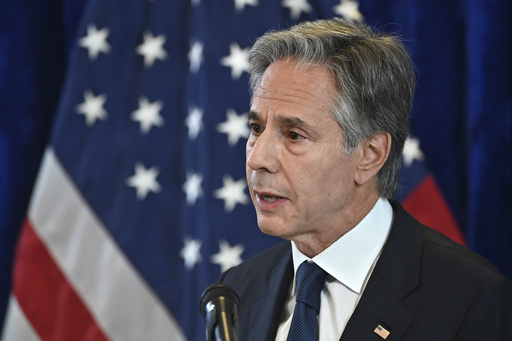In light of Israel’s targeted actions against Hezbollah in Lebanon, which have resulted in the elimination of several of the group’s influential leaders, there are emerging perspectives in Washington and beyond that this might present an opportunity to address the long-standing political deadlock in Lebanon. This would be a crucial step in mitigating the ongoing conflict.
To facilitate this, U.S. Secretary of State Antony Blinken engaged in separate discussions on Friday with the acting Prime Minister of Lebanon, Najib Mikati, and the parliamentary speaker, Nabhi Berri, emphasizing the urgent need to reach a resolution. Earlier in the week, Blinken also consulted with foreign ministers from Saudi Arabia, Qatar, and France regarding how the election of a new president in Lebanon might help alleviate tensions in the region by persuading Hezbollah to redeploy its militants away from Israel’s border in compliance with a United Nations Security Council resolution established following the 2006 conflict between Israel and Hezbollah.
During a press conference in Laos, Blinken articulated that the citizens of Lebanon have a vested interest in their state taking charge of its own governance and future. He pointed out that the Lebanese presidency has been unoccupied for two years, and having a head of state is vital for the nation’s populace.
Furthermore, he underscored that it is ultimately the Lebanese people’s decision regarding their country’s future, without influence from any external players, including the United States or Israel.
Efforts by the U.S. and other nations to break the political stalemate in Lebanon have often fallen short. The nation’s political framework, which relies on a sectarian power-sharing arrangement, has historically been susceptible to deadlocks. The U.S. attributes the ongoing two-year vacancy in the presidency to reluctance for compromise from Hezbollah, which, although supported by Iran and deemed a legitimate political party within Lebanon, is recognized as a terrorist organization by the U.S., Israel, and other nations.
Following the conclusion of former President Michel Aoun’s term in October 2022, Lebanon’s deeply fragmented parliament convened multiple times to select his successor but could not achieve consensus. Hezbollah has supported Sleiman Frangieh, a Christian candidate aligned with the group.
On the flip side, other political factions have proposed different candidates, but one individual frequently recognized as a potential rival to Frangieh—though he has not formally declared his candidacy—is General Joseph Aoun, Lebanon’s army chief, who is perceived as having a favorable stance toward the U.S.
As political impasses continue and efforts to resolve Lebanon’s dire economic crisis stall, three-quarters of the population have sunk into poverty. Nevertheless, some U.S. officials believe that recent setbacks for Hezbollah may create an opportunity for progress.
Contrarily, not everyone in Washington shares this optimistic view, with some analysts asserting that Hezbollah’s entrenched role in Lebanon’s political landscape renders its influence too substantial to simply eradicate. Nonetheless, even those skeptical of a shift are open to exploring new avenues.
While returning from Laos, Blinken reiterated the importance of resolving the political crisis during his conversations with Mikati and Berri. He affirmed the U.S. commitment to seeking a diplomatic resolution that aligns with the U.N. resolution, aiming for a safe environment for civilians on both sides of the Lebanon-Israel border and urging for a presidential election that genuinely reflects the desires of the Lebanese populace, which is essential for a stable and independent Lebanon.
Blinken has echoed similar sentiments in discussions over the past week with various foreign ministers, including those from Saudi Arabia, Qatar, Egypt, and France. He noted a collective eagerness not only from international stakeholders regarding Lebanon’s situation but also from the Lebanese people themselves, who seek a government capable of taking responsibility for the welfare of its citizens.
This month, Blinken is anticipated to participate in an international conference focused on Lebanon, organized by France. The U.N. resolution postulated that Israeli forces should withdraw completely from southern Lebanon following the conflict with Hezbollah, stipulating that the Lebanese military and U.N. peacekeepers would maintain exclusive control in that region.
Ed Gabriel, the president of the American Task Force on Lebanon, emphasized the importance of General Aoun’s leadership within the Lebanese army, noting its status as the only fully operational institution in Lebanon. He cautioned against external interference in Lebanon’s sovereign right to elect its leaders, suggesting there lies an opportunity for Lebanese lawmakers to choose a competent, reform-minded president capable of steering the country through its current tumultuous period.
